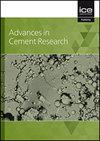基于脉冲激励技术和遗传算法的水泥砂浆抗压强度研究
IF 1.3
4区 工程技术
Q3 CONSTRUCTION & BUILDING TECHNOLOGY
引用次数: 0
摘要
抗压强度是水泥砂浆的一个重要机械性能,通常是通过破坏性测量来测量的。然而,有必要评估独特的水泥基样品在不同老化期内的强度,而不会造成损坏。本研究提出了一个使用遗传算法的预测框架,根据使用脉冲激励技术无损测量的普通水泥基砂浆的动态弹性模量来估计其抗压强度。通过结合Popovics和Lydon Balendran模型,用恒定系数计算样品的静态弹性模量,表示等效抗压强度。采用遗传算法来确定这些系数的最优值。结果表明,在动态杨氏模量的中间范围内,组合模型对Lydon Balendran方法更敏感,而基于Popovics的强度在较高和较低的动态杨氏模量水平下占主导地位。该模型显示出3.1%的低均方根误差(RMSE)值。研究结果表明,该非破坏性模型有潜力在行业中预测水泥砂浆的力学性能。它能够在不进行破坏性测试的情况下有效评估抗压强度,为可靠评估水泥基材料提供了优势。本文章由计算机程序翻译,如有差异,请以英文原文为准。
Compressive strength in cement mortars via impulse excitation technique and genetic algorithm
Compressive strength, a crucial mechanical property of cement mortars, is typically measured destructively. However, there is a need to evaluate the strength of unique cement-based samples over various aging periods without causing damage. This study proposes a predictive framework using a genetic algorithm to estimate the compressive strength of ordinary cement-based mortars based on their dynamic elastic modulus, measured non-destructively using the impulse excitation technique. By combining the Popovics and Lydon-Balendran models, the static elastic modulus of the samples is calculated with constant coefficients, representing an equivalent compressive strength. The genetic algorithm is employed to determine the optimal values for these coefficients. The results show that the combining model is more sensitive to the Lydon-Balendran approach within the middle range of the dynamic Young's modulus, while the Popovics-based strength dominates at higher and lower dynamic Young's modulus levels. The model exhibits a low root mean square error (RMSE) value of 3.1%. The findings suggest that this non-destructive model has potential as a candidate for predicting the mechanical properties of cement mortars in the industry. It enables efficient evaluation of compressive strength without destructive testing, offering advantages for assessing cement-based materials reliably.
求助全文
通过发布文献求助,成功后即可免费获取论文全文。
去求助
来源期刊

Advances in Cement Research
工程技术-材料科学:综合
CiteScore
3.70
自引率
5.00%
发文量
56
审稿时长
3.2 months
期刊介绍:
Advances in Cement Research highlights the scientific ideas and innovations within the cutting-edge cement manufacture industry. It is a global journal with a scope encompassing cement manufacture and materials, properties and durability of cementitious materials and systems, hydration, interaction of cement with other materials, analysis and testing, special cements and applications.
 求助内容:
求助内容: 应助结果提醒方式:
应助结果提醒方式:


